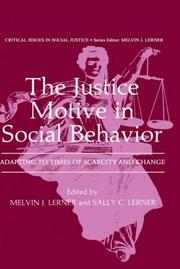| Listing 1 - 10 of 12 | << page >> |
Sort by
|

ISBN: 0306404958 9780306404955 Year: 1980 Publisher: New York (N.Y.): Plenum
Abstract | Keywords | Export | Availability | Bookmark
 Loading...
Loading...Choose an application
- Reference Manager
- EndNote
- RefWorks (Direct export to RefWorks)
Political philosophy. Social philosophy --- Social psychology --- Social justice --- Belief and doubt --- Psychological aspects --- -Equality --- Justice --- Conviction --- Doubt --- Consciousness --- Credulity --- Emotions --- Knowledge, Theory of --- Philosophy --- Psychology --- Religion --- Will --- Agnosticism --- Rationalism --- Skepticism --- Belief and doubt. --- Psychological aspects. --- -Psychological aspects --- Equality --- Social justice - Psychological aspects
Book
ISBN: 9781489904508 9781489904485 1489904484 1489904506 Year: 1980 Publisher: Boston, MA : Springer US,
Abstract | Keywords | Export | Availability | Bookmark
 Loading...
Loading...Choose an application
- Reference Manager
- EndNote
- RefWorks (Direct export to RefWorks)
The "belief in a just world" is an attempt to capmre in a phrase one of the ways, if not the way, that people come to terms with-make sense out of-find meaning in, their experiences. We do not believe that things just happen in our world; there is a pattern to events which conveys not only a sense of orderli ness or predictability, but also the compelling experience of appropriateness ex pressed in the typically implicit judgment, "Yes, that is the way it should be." There are probably many reasons why people discover or develop a view of their environment in which events occur for good, understandable reasons. One explanation is simply that this view of reality is a direct reflection of the way both the human mind and the environment are constructed. Constancies, patterns which actually do exist in the environment-out there-are perceived, represented symbolically, and retained in the mind. This approach cenainly has some validity, and would probably suffice, if it were not for that sense of "appropriateness," the pervasive affective com ponent in human experience. People have emotions and feelings, and these are especially apparent in their expectations about their world: their hopes, fears, disappointments, disillusionment, surprise, confidence, trust, despondency, anticipation-and certainly their sense of right, wrong, good, bad, ought, en titled, fair, deserving, just.
Book
ISBN: 9004585427 Year: 1986 Publisher: Leiden ; Boston : Brill,
Abstract | Keywords | Export | Availability | Bookmark
 Loading...
Loading...Choose an application
- Reference Manager
- EndNote
- RefWorks (Direct export to RefWorks)
Adaptability (Psychology) --- Social change --- Social justice --- Psychological aspects --- Psychological aspects

ISBN: 0306446995 1489909869 1489909842 Year: 1994 Volume: *1 Publisher: New York (N.Y.): Plenum
Abstract | Keywords | Export | Availability | Bookmark
 Loading...
Loading...Choose an application
- Reference Manager
- EndNote
- RefWorks (Direct export to RefWorks)
Attitudes d'inscription --- Attitudes of entitlement --- Betitelingsgewoonten --- Entitlement (Psychology) --- Entitlement attitudes --- Exaggerated entitlement (Psychology) --- Excessive entitlement (Psychology) --- Human relations --- Intermenselijke relaties --- Interpersonal relations --- Intimacy (Psychology) --- Intimiteit (Psychologie) --- Intimité (Psychologie) --- Justice sociale --- Lien social --- Liens sociaux --- Menselijke relaties --- Non-entitlement (Psychology) --- Nonentitlement (Psychology) --- Personal relations --- Rapports humains --- Rapports interpersonnels --- Rapports sociaux --- Rechtvaardigheid [Sociale ] --- Relaciones humanas --- Relaties [Intermenselijke ] --- Relaties [Menselijke ] --- Relations [Interpersonal ] --- Relations humaines --- Relations interpersonnelles --- Relations sociales --- Relationships [Interpersonal ] --- Rencontres interpersonnelles --- Sociabilité --- Social behavior --- Social justice --- Sociale rechtvaardigheid --- Intimité --- Emotions --- Love --- Equality --- Justice --- Attitude (Psychology) --- Interpersonal relationships --- Relations, Interpersonal --- Relationships, Interpersonal --- Social psychology --- Object relations (Psychoanalysis) --- Entitlement attitudes. --- Interpersonal relations. --- Social justice. --- Intimacy (Psychology). --- Intimité

ISBN: 0306453959 1475799292 1475799276 Year: 1996 Publisher: New York (N.Y.) Plenum
Abstract | Keywords | Export | Availability | Bookmark
 Loading...
Loading...Choose an application
- Reference Manager
- EndNote
- RefWorks (Direct export to RefWorks)
Social justice --- -Equality --- Justice --- Psychological aspects --- Social justice. --- Psychological aspects. --- -Psychological aspects --- Equality

ISBN: 9780306460302 Year: 1998 Publisher: New York : Plenum Press,
Abstract | Keywords | Export | Availability | Bookmark
 Loading...
Loading...Choose an application
- Reference Manager
- EndNote
- RefWorks (Direct export to RefWorks)
Social justice --- Belief and doubt. --- Victims of crimes --- Justice sociale --- Croyance et doute --- Victimes d'actes criminels --- Psychology. --- Psychologie

ISBN: 0306460300 Year: 1998 Publisher: New York (N.Y.): Plenum
Abstract | Keywords | Export | Availability | Bookmark
 Loading...
Loading...Choose an application
- Reference Manager
- EndNote
- RefWorks (Direct export to RefWorks)
Belief and doubt --- Social justice --- Victims of crimes --- Psychological aspects --- Psychology
Periodical
Abstract | Keywords | Export | Availability | Bookmark
 Loading...
Loading...Choose an application
- Reference Manager
- EndNote
- RefWorks (Direct export to RefWorks)

ISBN: 0306406756 148990431X 1489904298 9780306406751 Year: 1981 Publisher: New York (N.Y.): Plenum
Abstract | Keywords | Export | Availability | Bookmark
 Loading...
Loading...Choose an application
- Reference Manager
- EndNote
- RefWorks (Direct export to RefWorks)
Social change --- Sociology of law --- Social psychology --- Social justice --- Adaptability (Psychology) --- Psychological aspects --- 159.922.2 --- -Social change --- -Social justice --- -Equality --- Justice --- Change, Social --- Cultural change --- Cultural transformation --- Societal change --- Socio-cultural change --- Social history --- Social evolution --- Adaptation (Psychology) --- Adaptive behavior --- Flexibility (Psychology) --- Malleability (Psychology) --- Personality --- Adjustment (Psychology) --- Ecologische psychologie --- Congresses --- -Congresses --- -Ecologische psychologie --- 159.922.2 Ecologische psychologie --- -159.922.2 Ecologische psychologie --- Equality --- Psychological aspects&delete& --- Social justice - Psychological aspects - Congresses --- Social change - Psychological aspects - Congresses --- Adaptability (Psychology) - Congresses
Book
ISBN: 9781107640283 9781107002333 9780511976698 9781139078276 1139078275 9781139080569 1139080563 9781139080569 1107002338 1107640288 0511976690 1107220475 1139063650 1283112639 9786613112637 1139076000 1139082833 1139070266 9781107220478 9781139063654 9781283112635 6613112631 9781139076005 9781139082839 9781139070263 Year: 2011 Publisher: Cambridge New York Cambridge University Press
Abstract | Keywords | Export | Availability | Bookmark
 Loading...
Loading...Choose an application
- Reference Manager
- EndNote
- RefWorks (Direct export to RefWorks)
This volume argues that the commitment to justice is a fundamental motive and that, although it is typically portrayed as serving self-interest, it sometimes takes priority over self-interest. To make this case, the authors discuss the way justice emerges as a personal contract in children's development; review a wide range of research studying the influences of the justice motive on evaluative, emotional and behavioral responses; and detail common experiences that illustrate the impact of the justice motive. Through an extensive critique of the research on which some alternative models of justice are based, the authors present a model that describes the ways in which motives of justice and self-interest are integrated in people's lives. They close with a discussion of some positive and negative consequences of the commitment to justice.
Social justice. --- Justice. --- Self-interest. --- Justice sociale --- Justice --- Intérêt personnel --- Conduct of life --- Self --- Economic man --- NIMBY syndrome --- Injustice --- Law --- Common good --- Fairness --- Equality --- Health Sciences --- Psychiatry & Psychology
| Listing 1 - 10 of 12 | << page >> |
Sort by
|

 Search
Search Feedback
Feedback About UniCat
About UniCat  Help
Help News
News